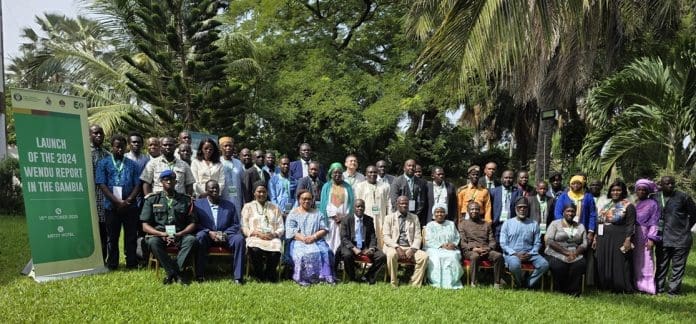The Economic Community of West African States (ECOWAS) has unveiled the 2024 West African Epidemiology Network on Drug Use (WENDU) Report in Banjul, The Gambia, marking a significant escalation in the region’s evidence-based approach to combating substance abuse and trafficking. Launched on 15 October 2025, the report represents the fifth edition of ECOWAS’ strategic analysis into drug demand and supply patterns across West Africa.
This year’s release marks a watershed moment for regional drug policy coordination. Unlike previous editions, the 2024 WENDU Report encompasses all 12 ECOWAS Member States for the first time, providing updated data for 2024 alongside a comprehensive policy brief and peer-reviewed publication. The expanded scope reflects ECOWAS’ commitment to generating actionable intelligence that transcends borders and informs cohesive regional responses to substance abuse.
Dr. Sintiki Tarfa Ugbe, Director of Humanitarian and Social Affairs at the ECOWAS Commission, underscored the report’s significance as a foundational tool for timely, data-driven policy interventions. She detailed ECOWAS’ substantial investment in drug treatment infrastructure and human capacity development, revealing that the Commission has exceeded USD 1.4 million in financing rehabilitation centres across ten Member States. The organisation has trained over 200 professionals utilising Universal Treatment and Prevention Curricula and supported the development of National Drug Master Plans in 14 Member States and Mauritania.
The Gambia’s Director General of the Drug Law Enforcement Agency (DLEAG), Mr. Demba Ceesay, articulated his country’s commitment to evidence-based strategies in tackling drug abuse and trafficking. Ceesay highlighted that WENDU has been instrumental in strengthening national responses through data-driven insights and capacity building support facilitated by ECOWAS.
Ceesay spotlighted The Gambia’s ongoing construction of its first specialised drug treatment and rehabilitation centre, an initiative directly inspired by WENDU findings. The development represents a paradigm shift toward rehabilitation rather than purely punitive approaches to drug use. Describing the centre as a critical milestone, Ceesay urged all stakeholders to leverage the WENDU Report as a regional compass guiding prevention, treatment, and reintegration efforts, stressing the necessity for compassion and collaboration in drug control strategies.
The Gambia’s Deputy Permanent Secretary, Mr. Abraham Mendy, delivered remarks on behalf of Minister of Interior Abdoulie Sanyang, reaffirming the Government’s unwavering commitment to regional and global cooperation in combating drug abuse, illicit trafficking, and transnational organised crime. Mendy positioned the WENDU Report as a critical milestone in advancing evidence-based policies to address substance abuse, particularly among young people.
He commended ECOWAS for its visionary leadership and expressed gratitude for the organisation’s support in constructing The Gambia’s first specialised treatment and rehabilitation facility. Mendy characterised the initiative as a testament to shared regional efforts toward establishing a safer, healthier, drug-free West Africa.
Dr. Momodou T. Nyassi, Director of Health Services at The Gambia’s Ministry of Health, reaffirmed the government’s dedication to advancing public health responses to substance abuse and mental health challenges. Nyassi conceptualised the WENDU Report as simultaneously a mirror reflecting addiction realities and a guide providing data necessary for meaningful action.
The health director urged stakeholders to adopt a compassionate, integrated, and evidence-based approach to substance abuse treatment. Nyassi emphasised that mental health and addiction treatment must become core priorities in constructing a healthier, more resilient West African community.
The WENDU initiative operates through national focal points and surveillance sites positioned across the region, systematically monitoring drug use patterns and identifying emerging trends while evaluating the effectiveness of regional interventions. This surveillance architecture enables ECOWAS to identify evolving challenges and respond with precision rather than reactive measures.
The 2024 report provides updated estimates and trends on drug use and trafficking across West Africa, generating intelligence critical for planning, programming, and advocacy at both national and regional levels. By consolidating data from all ECOWAS Member States, the report creates a comprehensive regional picture previously unavailable to policymakers and programme developers.
The launch in Banjul carried symbolic weight, positioning The Gambia as a partner jurisdiction in this regional evidence-gathering initiative. The location also highlighted the country’s progress in implementing ECOWAS-supported interventions, including the specialised treatment centre now under construction.
ECOWAS’ investment approach reflects recognition that substance abuse demands integrated, multi-sectoral responses spanning law enforcement, healthcare, public health, and social services. By funding treatment infrastructure, supporting professional training, and facilitating evidence generation, the Commission creates conditions for Member States to implement more effective, humane drug policies grounded in data rather than ideology.
The 2024 WENDU Report arrives amid growing recognition across West Africa that substance abuse represents not merely a law enforcement challenge but a public health crisis requiring compassionate, treatment-centred responses. The report’s emphasis on rehabilitation over punishment aligns with international best practices and contemporary understandings of addiction as a health condition rather than purely a criminal matter.
Source: newsghana.com.gh











